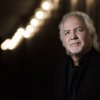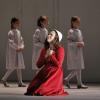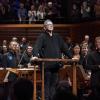Donald Runnicles was a constant presence on Van Ness Avenue during his 17 years as music director of San Francisco Opera. Between 1995 and 2002, he also conducted the San Francisco Symphony six times — then, inexplicably, vanished from the Symphony podium.
After nearly 25 years, he returned to Davies Symphony Hall on Friday, Sept. 26, for the first of three performances over the weekend. Leading music by Alban Berg and Gustav Mahler so magnificently, one can only wonder: What took so long?
Berg’s Seven Early Songs sit right on the edge of the musical shift from the late romanticism of Mahler and Richard Strauss to the increasingly dissonant world of his teacher, Arnold Schoenberg. It might be difficult to pin down how far each song wanders from its harmonic center, but Berg’s musical logic is so inexorable that you never feel lost. The poems Berg chose often revel in the natural world. Clouds, mountains, the sun and stars, flowers, a nightingale, the moon, a head on a lover’s knee, love, and spiritual wonder all play a part.
On Friday, Runnicles led a performance of soft edges, creating a glorious ocean of sound that mezzo-soprano Irene Roberts rode with ease. Roberts, who has appeared in five productions at San Francisco Opera since 2012, brought it all for her Symphony debut: a rich, warm voice, infinite breath control, ample volume, and the ability to spin out arching lines that shaped character and mood.
Carl Hauptmann’s “Nacht” (Night) opens with slithery harmonies, its long lines allowing Roberts’ glorious, enveloping tone to demonstrate remarkable legato. She closed Rainer Maria Rilke’s “Traumgekrönt” (Dream-Crowned) with a breathtaking diminuendo that seemed to go on forever and brought pure happiness to Johannes Schlaf’s “Im Zimmer” (In the Room).
The Berg songs last only a bit more than 15 minutes, and from the audience response on Friday, an encore would have been most welcome.
At the Opera, Runnicles could always be counted on to bring color and coherence to every gigantic work he performed. It was no surprise, then, that his account of Mahler’s First Symphony rose to exalted heights — the equal of what Bay Area audiences have heard from former music directors Michael Tilson Thomas and Esa-Pekka Salonen, both superb Mahlerians, over the last 30 years.
Runnicles led with hot-blooded fervor, without burying Mahler’s counterpoint under the huge orchestral forces. The conductor’s pacing, in turn, brought drama to every bar.
All the colors of the symphony were sharply etched. The pellucid strings and chirping winds of the first movement’s opening gave way to the gentle first theme, drawn from the composer’s song cycle Lieder eines fahrenden Gesellen (Songs of a Wayfarer). The second movement had immense charm, the cellos digging into the rustic, waltz-time Ländler with luscious warmth.
The third movement unfolded marvelously and lugubriously, with Mahler’s wry, minor key version of “Frère Jacques.” The double reeds conquered all in their klezmer-like interjection. Associate concertmaster Jason Issokson, who recently joined the orchestra, and assistant concertmaster Wyatt Underhill duetted as if they’d been playing together for years.
The long and tumultuous last movement opens with a volley of percussion and brass amid whirling strings. Themes from earlier in the symphony return, new themes join in. A gentle central section brings calm amid the passion, yet the music carries a palpable sense of struggle before finally steering toward safe harbor, the brass blazing to the fore in a series of fanfares. Few moments in the symphonic repertoire thrill more than the horns rising to their feet, bells up, at the close of the movement.
The performance was a triumph for all, especially for Runnicles and all the wind and brass players. Let’s hope he returns soon.




